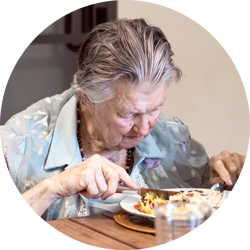Assisting with Meals and Nutrition
Assisting with meals and nutrition involves providing support and care to individuals, often those with specific dietary needs or limitations, to ensure they receive proper nutrition and maintain their overall health. This can be a crucial aspect of caregiving in various settings, such as healthcare facilities, home care, or senior living communities. Here are some key components of assisting with meals and nutrition:

1. Dietary Assessment
Begin by understanding the individual’s dietary needs and restrictions. This may involve consulting with healthcare professionals or dietitians to determine specific dietary requirements, such as managing diabetes, food allergies, or meeting certain nutritional goals.

2. Meal Planning
Plan and prepare meals that align with the individual’s dietary guidelines. This includes selecting appropriate foods, portion control, and considering taste preferences. Specialized diets may include low-sodium, low-fat, gluten-free, or pureed diets for those with swallowing difficulties.

3. Food Safety
Ensure that food is prepared, stored, and served safely to prevent foodborne illnesses. This includes proper food handling, refrigeration, and sanitation.

4. Feeding Assistance
For individuals who have difficulty feeding themselves, provide assistance with eating. This may involve spoon-feeding, cutting food into manageable pieces, or helping with drinking fluids.

5. Monitoring and Observation
Keep a watchful eye on the individual during meals. Look for signs of discomfort, difficulty swallowing, or choking, and respond promptly to any issues.

6. Nutritional Education
Provide education and information to the individual and their family about the importance of proper nutrition and dietary guidelines. This can help promote better dietary choices and overall health.

7. Hydration
Ensure that the individual is adequately hydrated by offering water, juice, or other suitable beverages. Some individuals may require specific fluid restrictions, so it’s important to monitor and follow these guidelines.

8. Mealtime Assistance
Create a pleasant and supportive mealtime environment. Engage in conversation, make the dining experience enjoyable, and be patient with those who may take longer to eat.

9. Dietary Modifications
Adjust the individual’s diet as necessary, considering changes in their health or dietary requirements. Regularly review the dietary plan to ensure it remains appropriate.

10. Documentation
Maintain records of the individual’s food intake, any dietary changes, and observations related to their eating habits. This documentation can be useful for healthcare providers, caregivers, and family members.

11. Collaboration
Work closely with healthcare professionals, dietitians, and other caregivers to ensure the individual’s nutritional needs are met effectively and that their overall health is monitored.

12. Emotional Support
Recognize the importance of emotional well-being during mealtime. Offer encouragement and emotional support, especially to individuals who may have challenges related to eating.
Assisting with meals and nutrition is a vital aspect of care, as it directly impacts an individual’s physical health, quality of life, and overall well-being. It requires a combination of practical skills, knowledge of dietary guidelines, and a compassionate, patient-centered approach to ensure that those in your care receive the best nutrition possible.
